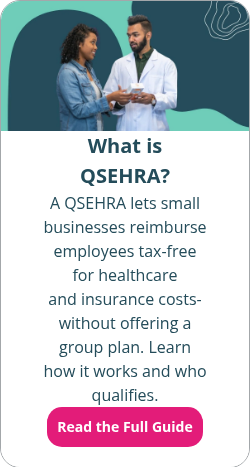How does the QSEHRA work with Medicare?
By Holly Bengfort on June 6, 2024 at 7:05 AM
As of March 2023, Medicare covers more than 65 million Americans, according to the >Centers for Medicare & Medicaid Services1. If you're enrolled in Medicare or have several employees on Medicare, you may be wondering if it works with the qualified small employer health reimbursement arrangement (QSEHRA).
In this article, we'll clarify how the QSEHRA works for employees who have Medicare in any form.
Takeaways from this blog post:
- The QSEHRA is a cost-effective option for small businesses to offer health benefits to their employees, including those on Medicare.
- Medicare beneficiaries can use their QSEHRA allowance toward eligible medical costs, including individual health insurance premiums.
- Other HRAs, like the ICHRA and GCHRA, have specific rules for participating and eligibility for each can be impacted by Medicare.
What is the QSEHRA?
The QSEHRA is a cost-effective alternative to traditional group health plan coverage. It's an employer-funded, IRS-approved health benefit. Instead of offering their employees a traditional group health plan, employers can offer them a tax-free allowance to use on eligible medical costs, including individual health insurance premiums.
The QESHRA is for organizations with fewer than 50 full-time equivalent employees (FTEs) that don’t offer a group plan. All full-time W-2 employees are automatically eligible for the QSEHRA as long as they have plans that provide minimum essential coverage (MEC), such as those purchased on the individual market. Employers can also choose to offer a QSEHRA to their part-time employees.
Here are a few other HRA-eligible expenses:
- Preventive care
- Emergency care
- Over-the-counter medicine
- Prescription drugs
- Dental care
- Vision care
- Chiropractic care
- Mental health counseling
What is Medicare?
Medicare is a federal health insurance program for Americans aged 65 and older, as well as certain younger individuals with disabilities. It's divided into several parts, including Part A (hospital insurance), Part B (medical insurance), Part C (Medicare Advantage), and Part D (prescription drug coverage).
Beneficiaries can choose to receive their benefits through traditional Medicare or a private Medicare Advantage plan. Medicare provides health insurance coverage for certain healthcare services and medications, with beneficiaries typically paying premiums, deductibles, and copayments for covered services. Overall, Medicare helps to ensure that older Americans and individuals with disabilities have access to necessary healthcare services.
How does the QSEHRA work with Medicare?
The following table shows which Medicare plans work with the QSEHRA and under what conditions:
|
Does it work with the QSEHRA? |
|
|
Medicare Part A |
Yes - Your employer can reimburse Medicare Part A premiums with a QSEHRA if you enrolled voluntarily*. Medicare Part A meets MEC standards, so you can participate in a QSEHRA. |
|
Medicare Part B |
Yes - Your employer can reimburse Medicare Part B premiums with a QSEHRA. Medicare Part B doesn’t count as MEC. It must be combined with Part A or C** for you to participate in a QSEHRA. |
|
Medicare Part C |
Yes, Medicare Advantage plan premiums are eligible for reimbursement with a QSEHRA. It also counts as MEC coverage. |
|
Medicare Part D |
Yes - Your employer can reimburse you for Medicare Part D premiums with a QSEHRA if a plan with MEC covers you, such as Medicare Parts A or C. |
* If you're enrolled automatically in Medicare Part A through Social Security, then the Internal Revenue Code (IRC) doesn't consider the payroll tax paid for Medicare Part A to be a medical expense. Therefore, it's not reimbursable through the QSEHRA.
** Part A can work on its own, but not Part B. If you have Part B, you must also have Parts A or C to meet MEC requirements.
Do other types of HRAs work with Medicare?
Next, let's explore how Medicare interacts with other common types of HRAs.
The individual coverage HRA (ICHRA) is for businesses of all sizes. Employees need to have their own individual health plan coverage to participate in this benefit. It's similar to the QSEHRA but allows for greater customization. There's no annual contribution limit and employers can offer different allowances to separate classes of employees, such as full-time employees and part-time employees. However, Medicare-eligible employees can't be their own separate class. They must go in the same category as other employees based on their employment status.
To participate in the ICHRA, eligible employees and their dependents must have a qualifying type of individual health insurance policy, which includes Medicare Part A and B together or Part C.
Now to the group coverage HRA (GCHRA). Unlike the ICHRA and the QSEHRA, the GCHRA supplements employer-sponsored group health coverage. It helps pay for out-of-pocket expenses the primary plan may not fully cover. However, the GCHRA is the only HRA type that doesn't work with any Medicare insurance plans. Medicare is for individual insurance, and the GCHRA only works with employer-sponsored group health plans, making them incompatible.
Conclusion
The ability to help employees pay for their Medicare premium costs is yet another advantage of the qualified small employer HRA (QSEHRA). When paired together, a Medicare plan and QSEHRA can help employees save big on their medical care expenses. This makes the QSEHRA a go-to HRA for employers who want to help keep their healthcare spending in check while helping their employees afford their own individual health insurance coverage and out-of-pocket expenses.
This article was originally published on August 10, 2018. It was last updated on June 6, 2024.
Check out more resources
See these related articles

Business owner eligibility under a QSEHRA [infographic]
Curious about QSEHRA eligibility for business owners? This informative infographic breaks down everything you need to know in a simple, visually engaging format.

QSEHRA eligible expenses: What can you reimburse with a QSEHRA?
Discover which medical expenses are eligible for reimbursement under a QSEHRA. Learn what qualifies and how to maximize your health benefit.

Health insurance reimbursements: What are the options?
Explore your options for health insurance reimbursement. Understand what insurance reimbursement means and how HRAs can support employees.



